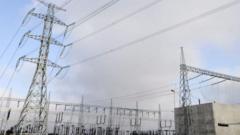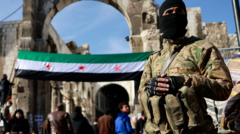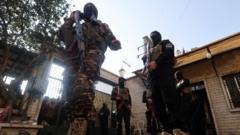As Syria's interim government hunts for senior figures from Bashar al-Assad’s regime, the country's landscape remains fraught with sectarian tensions and calls for accountability.
Syria's New Government Targets Assad Loyalists Amid Unrest

Syria's New Government Targets Assad Loyalists Amid Unrest
In an effort to stabilize the country, Syrian authorities are pursuing former officials tied to the ousted regime.
Security forces for Syria’s interim government are currently engaged in a manhunt for Mohammed Kanjou al-Hassan, a former senior military justice official under the leadership of ex-President Bashar al-Assad. His apprehension comes amidst escalating unrest in multiple regions of the country. The Syrian Observatory for Human Rights reported that al-Hassan is implicated in war crimes against civilians and is believed to have been involved in atrocities committed during the long years of the civil war.
An attempt to arrest al-Hassan on December 25th triggered violent clashes in Tartus, a region significant to al-Assad's Alawite community. Loyalists to the former regime allegedly ambushed government forces, resulting in the deaths of fourteen security personnel, as confirmed by Syria's interim interior minister, Mohammed Abdel Rahman.
The push to capture al-Hassan and potentially other key figures from the previous regime demonstrates the transitional government's aim to enforce law and order while addressing the demand for justice among the populace. Additionally, government forces have been deployed in al-Hassan's hometown, aiming to combat remnants of Assad-affiliated militias and restore stability in the area, which has seen growing unrest.
Protests, particularly among Alawite groups, have surged in cities like Latakia and Homs, partly ignited by the resurgence of a controversial video that depicted an alawite shrine burning. Although Syrian officials claimed the footage was outdated and purposefully circulated to incite division, the incident has nonetheless heightened sectarian tensions, raising fears among minority communities regarding their security under the new administration.
Rebel leader Ahmad al-Shara, who was instrumental in the effort to overthrow al-Assad, has assured that the rights of minority groups will be safeguarded. However, apprehension remains palpable among various sects, including Alawites, Christians, and Kurds, about their future safety. In light of these tensions, the interim ministry of information has implemented a ban on the dissemination of content that could further exacerbate sectarian strife.
An attempt to arrest al-Hassan on December 25th triggered violent clashes in Tartus, a region significant to al-Assad's Alawite community. Loyalists to the former regime allegedly ambushed government forces, resulting in the deaths of fourteen security personnel, as confirmed by Syria's interim interior minister, Mohammed Abdel Rahman.
The push to capture al-Hassan and potentially other key figures from the previous regime demonstrates the transitional government's aim to enforce law and order while addressing the demand for justice among the populace. Additionally, government forces have been deployed in al-Hassan's hometown, aiming to combat remnants of Assad-affiliated militias and restore stability in the area, which has seen growing unrest.
Protests, particularly among Alawite groups, have surged in cities like Latakia and Homs, partly ignited by the resurgence of a controversial video that depicted an alawite shrine burning. Although Syrian officials claimed the footage was outdated and purposefully circulated to incite division, the incident has nonetheless heightened sectarian tensions, raising fears among minority communities regarding their security under the new administration.
Rebel leader Ahmad al-Shara, who was instrumental in the effort to overthrow al-Assad, has assured that the rights of minority groups will be safeguarded. However, apprehension remains palpable among various sects, including Alawites, Christians, and Kurds, about their future safety. In light of these tensions, the interim ministry of information has implemented a ban on the dissemination of content that could further exacerbate sectarian strife.






















